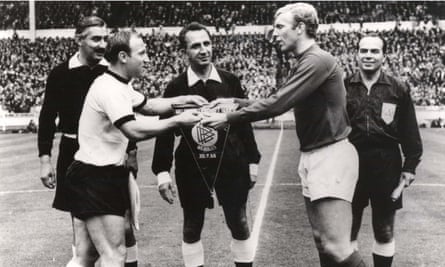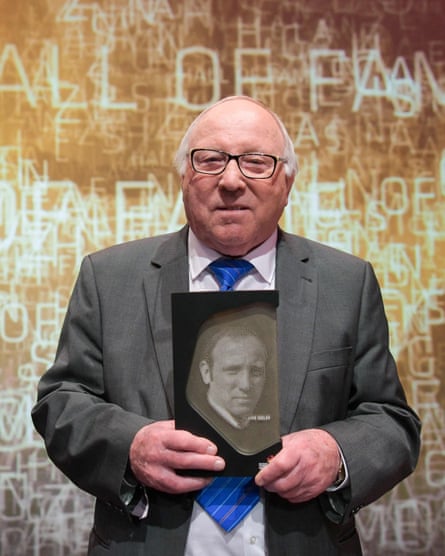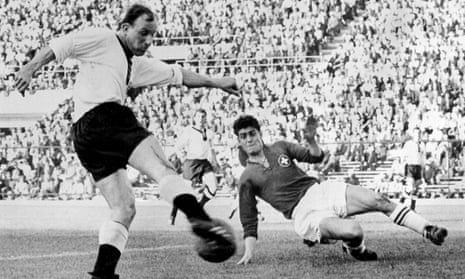“If there was a brick wall there and the ball was on the other side, then Uwe Seeler would go right through it,” said the Northern Ireland international Jimmy McIroy. Such was the reputation of the squat little centre-forward whose very name became a war cry – “Uwe, Uwe, Uwe!” – for fans of West Germany in the 1950s and 60s.
Seeler, who has died aged 85, played for his country in four World Cups, even though, between the 1962 and 1966 competitions, he had to be fitted with an artificial achilles tendon. Before the more elegant and technical era of Franz Beckenbauer, and even some distance into it, he represented the traditional strengths of German football: power, high morale, commitment and an indomitable will to win.
Although he was unable to pick up a World Cup winners’ medal, he played in the 1966 final against England at Wembley, where he was captain, and led the side again in 1970 as West Germany took third place in Mexico. In domestic football he spent his entire career with Hamburg and was German footballer of the year three times, in 1960, 1964 and 1970. He is widely regarded as one of the greatest footballers the country has produced.
Born in Hamburg, Seeler was the son of Erwin, a harbour worker and former Hamburg player, and his wife, Anny. He was still only 17 when he made his first appearance for West Germany, as a substitute outside-left against France in Hanover in 1954. He played in his first World Cup finals in Sweden in 1958, scoring in the opening game, a 3-1 win against Argentina, after an exchange of passes with Hans Schäfer. In the semi-final in Gothenburg, against Sweden, he reciprocated by crossing for Schäfer to score with a ferocious 25-yard volley, but West Germany lost 3-1. Seeler also played in the third place match in Gothenburg, a 6-3 defeat against France, for whom Just Fontaine racked up four goals.

In the next World Cup finals in Chile in 1962, when West Germany went out in the quarter-finals to Yugoslavia, Seeler was as boldly effective as ever, scoring a notable goal against the hosts in Santiago with a brave, plunging header. He was indeed astonishingly good with his head for so short a man (he was 5ft 7in), jumping far higher than might ever have been expected.
Seeler’s achilles tendon operation would subsequently put him out for a year, but in September 1965 he was back in the West Germany side in a crucial World Cup qualifying match against Sweden in Stockholm. He scored, and the Germans won 2-1, going on to the finals in England.
There Seeler was as talismanic as ever, appearing in every West Germany game. He scored the winning goal against Spain in a 2-1 victory in the eliminating group, and another at Sheffield in a torrid quarter-final against Uruguay. Horacio Troche, the Uruguay captain, had been sent off for a retaliatory kick in the stomach to Lothar Emmerich. As he came off the field Troche slapped Seeler in the face, but the German did not retaliate. “The silly fellow was trying to provoke me,” he said. In the Wembley final, against England, Seeler played his usual robust game, but this time he couldn’t score and England took the spoils, 4-2 after extra time.
Comfortably established as a representative for the Adidas sports goods firm, it looked, during the years between the 1966 and 1970 World Cups, as if Seeler’s international career was done. Of the 11 internationals played by West Germany in 1969 he figured only in one. Bayern Munich, the pioneers of total football, were the new reality, and their stocky opportunist, the prolific Gerd Müller, was the international centre-forward.
It seemed unlikely that he and Seeler could ever co-exist, but in the World Cup of 1970 in Mexico they triumphantly did so; both on and off the field. Uwe was quite content to drop back behind Müller and support him from midfield. In the team’s hotel they shared a bedroom. Seeler would play in all six games for the Germans, and would score in four of them; most significantly in Leon, against England in the quarter-finals, when he rose to a ball put in by Karl-Heinz Schnellinger and back-headed it over a stunned Peter Bonetti, the England goalkeeper. A fluke? Many have said so, but the leap was still formidable.

Previously he had scored two goals against Peru, and others versus Morocco and Bulgaria. But the Germans, with Beckenbauer’s arm strapped to his side, went out 4-3 to Italy in the semi-final at the Azteca stadium, a match often referred to as “the game of the century”. Seeler’s far-post header made Müller a goal in that encounter.
There was still another international game to come for Seeler, in Nuremberg in September 1970, giving him his 72nd cap, which was then a national record. It has been easily surpassed since, but there were fewer games in those days and Seeler would clearly have won many more caps had it not been for his achilles tendon injury. He scored 43 goals during his international career, nine of them in World Cup finals matches.
He remained loyal to Hamburg throughout his playing career and was five times top scorer in the West German league, scoring no fewer than 36 goals in season 1959/60. Two of those came in a 3-2 win against Cologne, which gave Hamburg the national title, and he also scored a hat-trick in the West German cup final of 1963, which Hamburg won 3-0 against Borussia Dortmund. In 1968 he was captain of the Hamburg team that reached the final of the European Cup Winners’ Cup, scoring eight goals along the way, although Milan won the final. In all Seeler scored 404 goals from 476 league games, in many of which he appeared with his older brother, Dieter, who also played for Hamburg.
After retirement in 1972 Seeler continued his advisory work with Adidas, set up his own sportswear company, and had a number of other business interests, including ownership of a petrol station. In addition he became a leading executive at Hamburg, and was president of the club for just over two years from 1995. Since 2005 Hamburg’s stadium has been home to a giant sculpture of his right foot.
He married Ilka, a handball player, in 1959. They had three daughters and seven grandchildren.

Comments (…)
Sign in or create your Guardian account to join the discussion